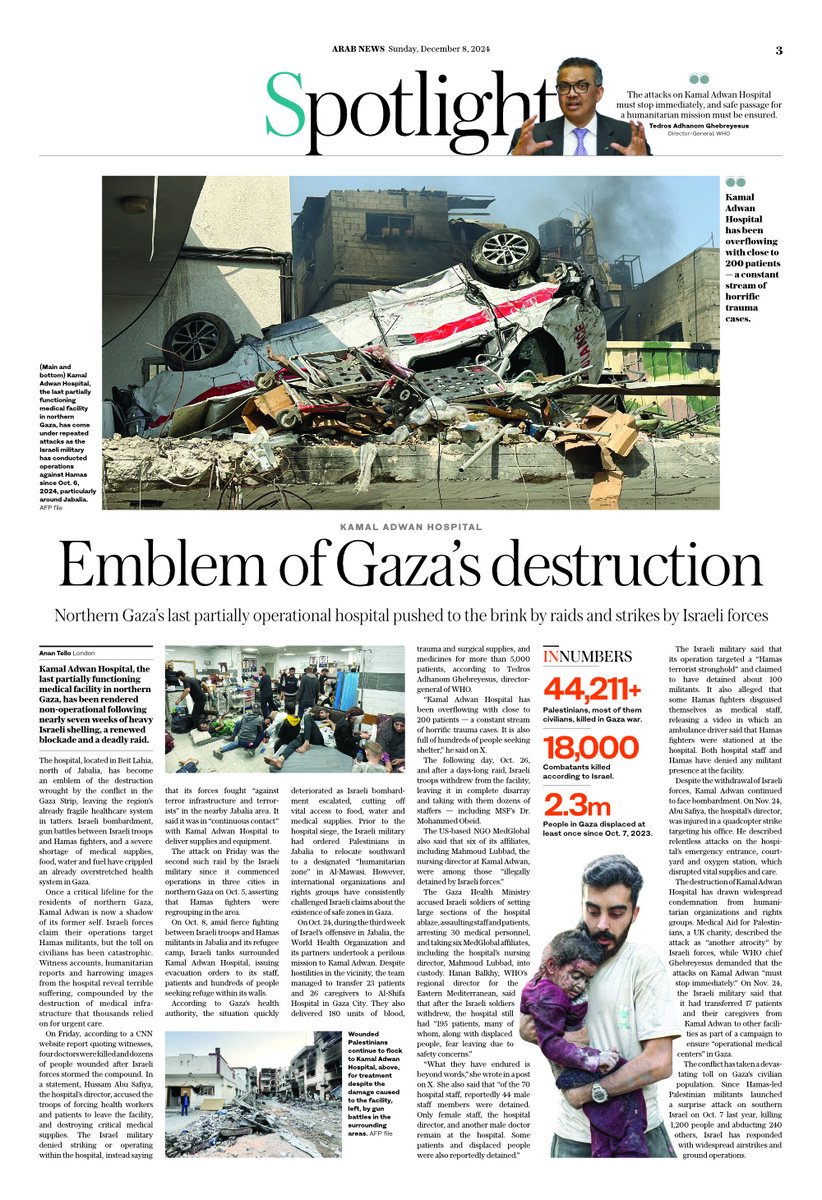LONDON: Kamal Adwan Hospital, the last partially functioning medical facility in northern Gaza, has been rendered non-operational following nearly seven weeks of heavy Israeli shelling, a renewed blockade and a deadly raid.
The hospital, located in Beit Lahia, north of Jabalia, has become an emblem of the destruction wrought by the conflict in the Gaza Strip, leaving the region’s already fragile health care system in tatters.
Israeli bombardment, gun battles between Israeli troops and Hamas fighters, and a severe shortage of medical supplies, food, water and fuel have crippled an already overstretched health system in Gaza.
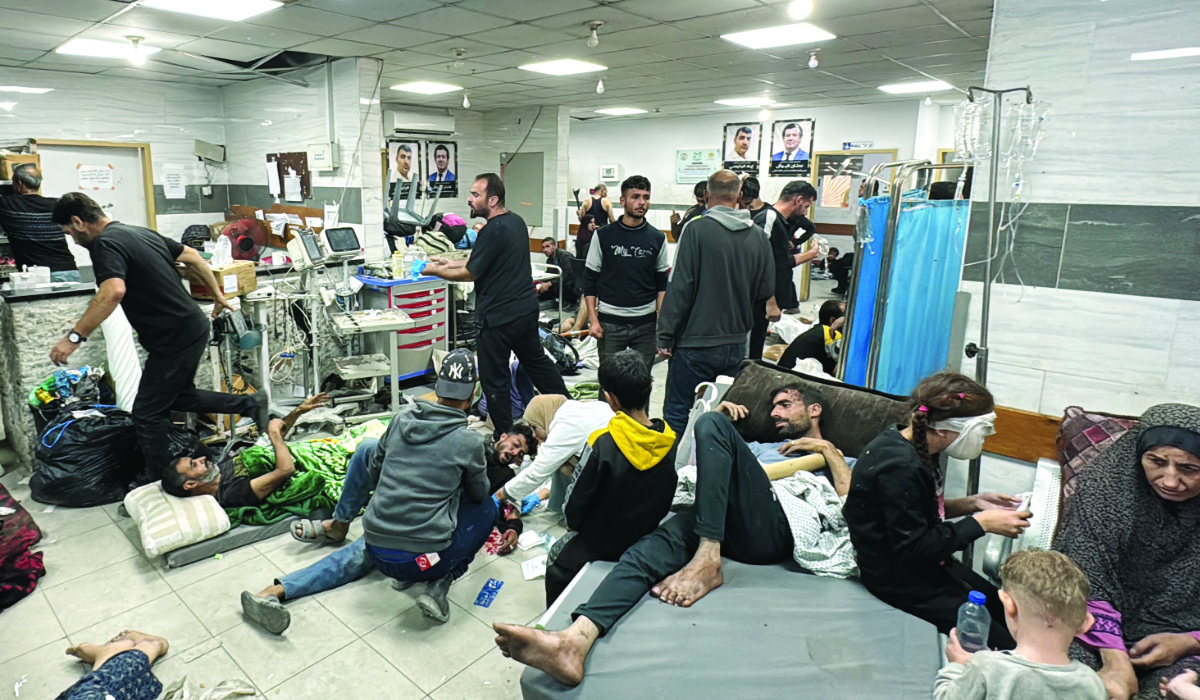
Wounded Palestinians receive treatment at the Kamal Adwan Hospital in Beit Lahia the northern Gaza Strip on October 26, 2024 amid the ongoing war in the Palestinian territory between Israel and Hamas. (AFP)
Compounding the misery of Gaza’s 2.3 million people, most of whom have been repeatedly displaced, heavy winter rains have flooded tents across the enclave, spoiling food and damaging plastic and cloth sheeting that had protected the displaced Palestinians against the elements.
Israel says that its forces seek to minimize civilian fatalities but that Hamas uses Gaza’s civilian infrastructure, including homes, hospitals, schools and mosques, as shields for its military operations. As of Nov. 5, only 17 of the enclave’s 36 hospitals remained partially functional, according to UN figures.
Once a critical lifeline for the residents of northern Gaza, Kamal Adwan is now a shadow of its former self. Israeli forces claim their operations target Hamas militants, but the toll on civilians has been catastrophic. Witness accounts, humanitarian reports and harrowing images from the hospital reveal terrible suffering, compounded by the destruction of medical infrastructure that thousands relied on for urgent care.
IN NUMBERS
• 44,211+
Palestinians, most of them civilians, killed in Gaza war.
• 18,000
Combatants killed according to Israel.
• 2.3m
People in Gaza displaced at least once since Oct. 7, 2023.
On Friday, according to a CNN website report quoting witnesses, four doctors were killed and dozens of people wounded after Israeli forces stormed the compound. In a statement, Hussam Abu Safiya, the hospital’s director, accused the troops of forcing health workers and patients to leave the facility, and destroying critical medical supplies.
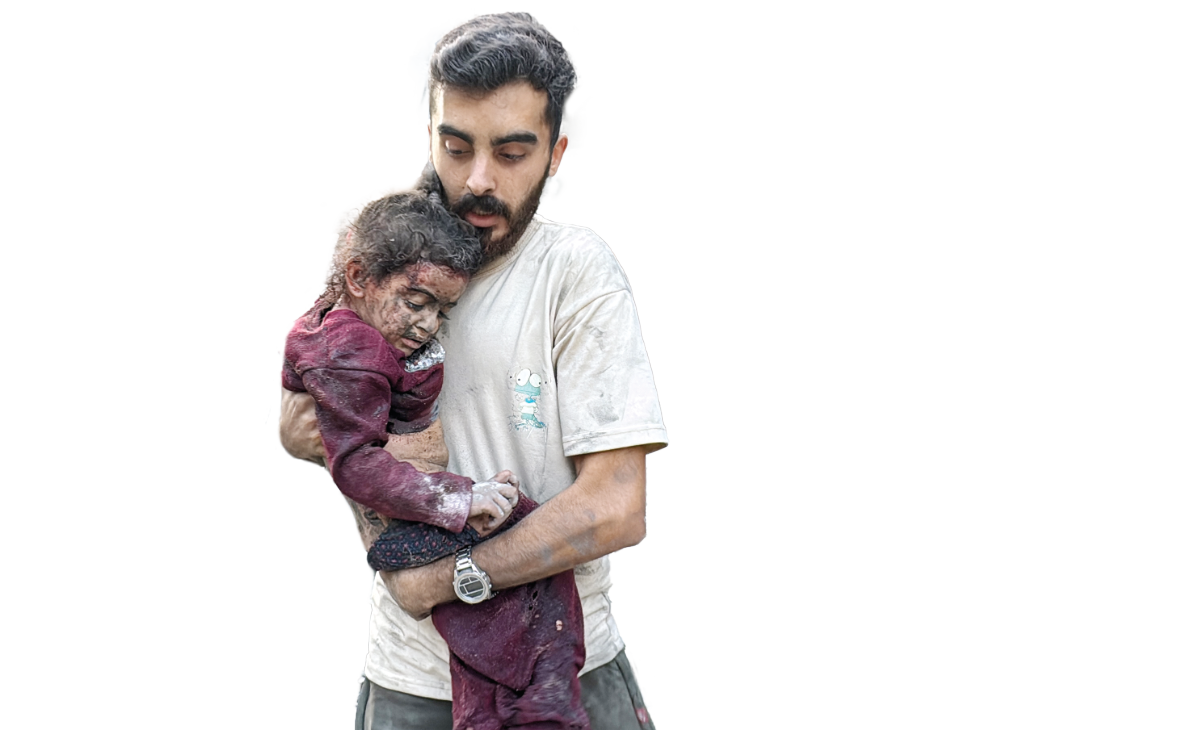
A Palestinian man carries away an injured child from a home that was hit in an Israeli strike on the Jabalia refugee camp in the northern Gaza Strip, on November 7, 2024. (AFP)
The Israel military denied striking or operating within the hospital, instead saying that its forces fought “against terror infrastructure and terrorists” in the nearby Jabalia area. It said it was in “continuous contact” with Kamal Adwan Hospital to deliver supplies and equipment.
The attack on Friday was the second such raid by the Israeli military since it commenced operations in three cities in northern Gaza on Oct. 5, asserting that Hamas fighters were regrouping in the area. It warned of “systematic strikes and the radical destruction of terrorist structures.”
On Oct. 8, amid fierce fighting between Israeli troops and Hamas militants in Jabalia and its refugee camp, Israeli tanks surrounded Kamal Adwan Hospital, issuing evacuation orders to its staff, patients and hundreds of people seeking refuge within its walls.
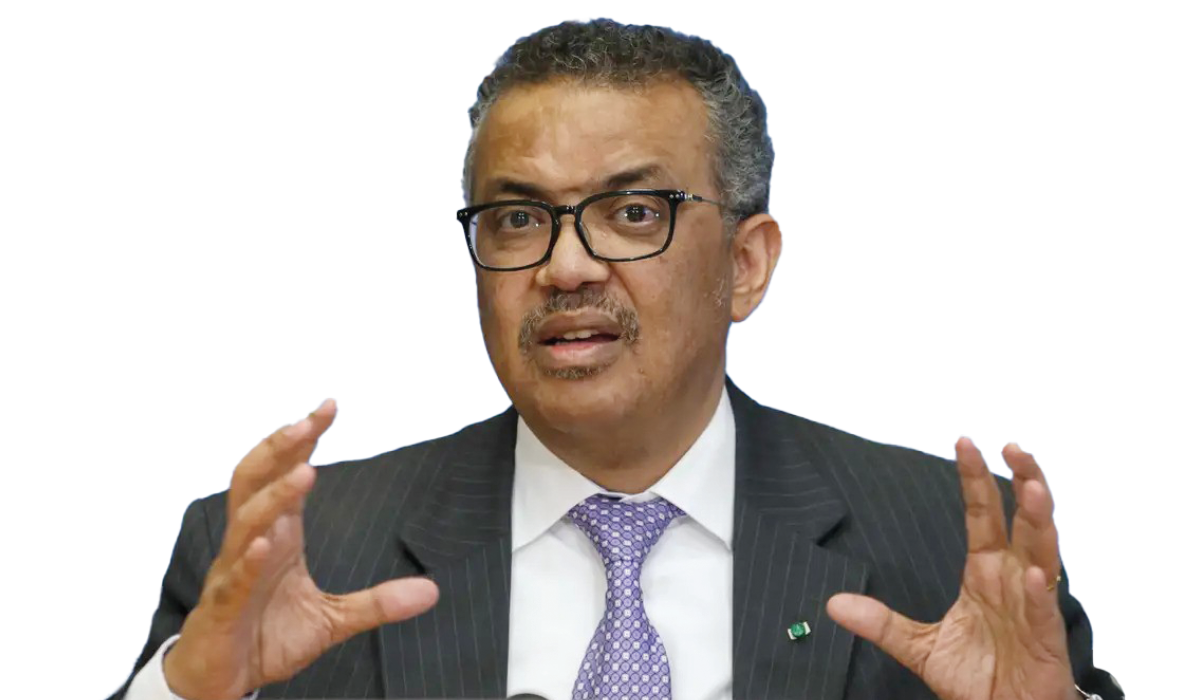
The attacks on Kamal Adwan Hospital must stop immediately, and safe passage for a humanitarian mission must be ensured, says Tedros Adhanom Ghebreyesus, Director-General, WHO
According to Gaza’s health authority, the situation quickly deteriorated as Israeli bombardment escalated, cutting off vital access to food, water and medical supplies.
Prior to the hospital siege, the Israeli military had ordered Palestinians in Jabalia to relocate southward to a designated “humanitarian zone” in Al-Mawasi. However, international organizations and rights groups have consistently challenged Israeli claims about the existence of safe zones in Gaza. In July, UN Secretary-General Antonio Guterres stated emphatically: “Nowhere (in Gaza) is safe. Everywhere is a potential killing zone.”
On Oct. 24, during the third week of Israel’s offensive in Jabalia, the World Health Organization and its partners undertook a perilous mission to Kamal Adwan. Despite hostilities in the vicinity, the team managed to transfer 23 patients and 26 caregivers to Al-Shifa Hospital in Gaza City. They also delivered 180 units of blood, trauma and surgical supplies, and medicines for more than 5,000 patients, according to Tedros Adhanom Ghebreyesus, director-general of WHO.
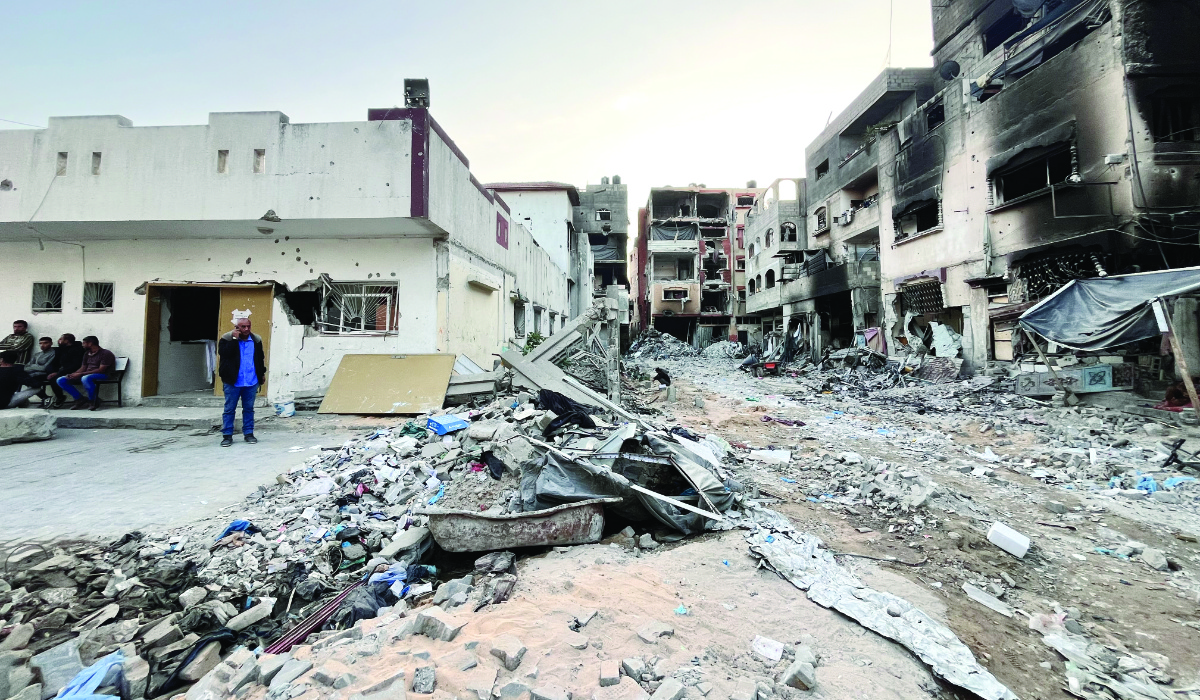
Rubbish and debris are scattered near damaged buildings in the vicinity of the Kamal Adwan hospital in Beit Lahya in the northern Gaza Strip on October 31, 2024, amid the ongoing war between Israel and the Palestinian Hamas movement. (AFP)
“Kamal Adwan Hospital has been overflowing with close to 200 patients — a constant stream of horrific trauma cases. It is also full of hundreds of people seeking shelter,” he said on X.
Noting that the WHO mission returned at 3:30am, Ghebreyesus said “accessing hospitals across Gaza is getting unbelievably harder and exposes our staff to unnecessary danger.”
Hours later, the WHO said that it had lost touch with Kamal Adwan’s staff. In the afternoon, Medecins Sans Frontieres (MSF) said it had also lost contact with its staff member and orthopedic surgeon Mohammed Obeid, who was sheltering and working in the hospital.
Kamal Adwan Hospital has been overflowing with close to 200 patients — a constant stream of horrific trauma cases.
Tedros Adhanom Ghebreyesus, Director-General, WHO
The following day, Oct. 26, and after a days-long raid, Israeli troops withdrew from the facility, leaving it in complete disarray and taking with them dozens of staffers — including MSF’s Obeid.
The US-based NGO MedGlobal also said that six of its affiliates, including Mahmoud Lubbad, the nursing director at Kamal Adwan, were among those “illegally detained by Israeli forces.”
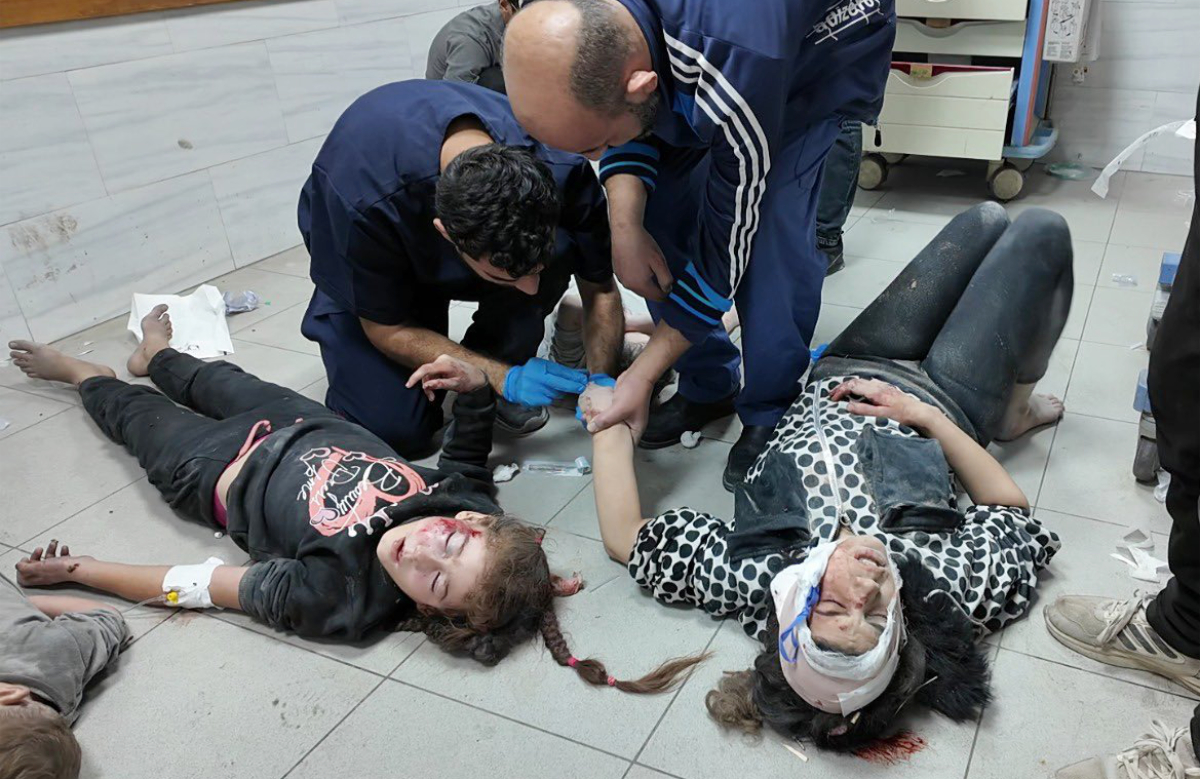
For the people of northern Gaza, it was more than just a medical facility; it was a lifeline in a region under siege. (Photo: X @DrTedros)
The Gaza health ministry accused Israeli soldiers of setting large sections of the hospital ablaze, assaulting staff and patients, arresting 30 medical personnel, and taking six MedGlobal affiliates, including the hospital’s nursing director, Mahmoud Lubbad, into custody.
Khalil Daqran, spokesperson for Gaza’s health ministry, described the raid as an act of deliberate destruction. “The army stormed Kamal Adwan Hospital, causing widespread destruction; setting large parts on fire, destroying the hospital’s entrances, and demolishing surrounding walls,” he said in a video statement. “Patients and medical staff were assaulted, with many patients and companions arrested, along with most of the medical staff. The fate of 30 medical personnel remains unknown.
“The (Israeli) army has removed the hospital from service entirely, destroying all its contents. There are now no medicines, medical supplies or food within the hospital.”
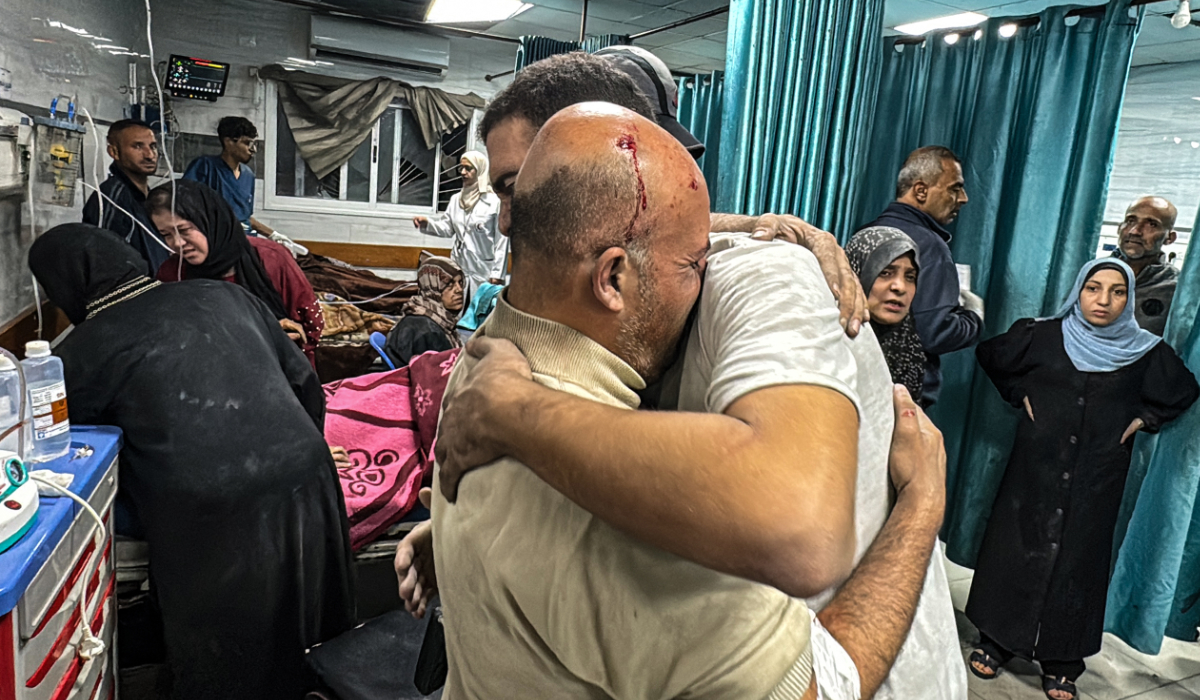
People comfort each other inside the Kamal Adwan hospital, as victims receive medical care following an Israeli strike that hit an area near the medical establishment in Beit Layia in the northern Gaza Strip early on November 21, 2024, reportedly leaving dozens of people killed or unaccounted for. (AFP)
Gaza’s health authority said that more than 600 people were trapped in Kamal Adwan during the Israeli military incursion.
Witnesses recounted chilling scenes. According to the Australian broadcaster ABC, Israeli soldiers beat patients until they bled, used dogs to intimidate children, and forced more than 100 men — many of them ill or injured — to strip down to their underwear in the cold before taking them away.
Hanan Balkhy, WHO’s regional director for the Eastern Mediterranean, said that after the Israeli soldiers withdrew, the hospital still had “195 patients, many of whom, along with displaced people, fear leaving due to safety concerns.”
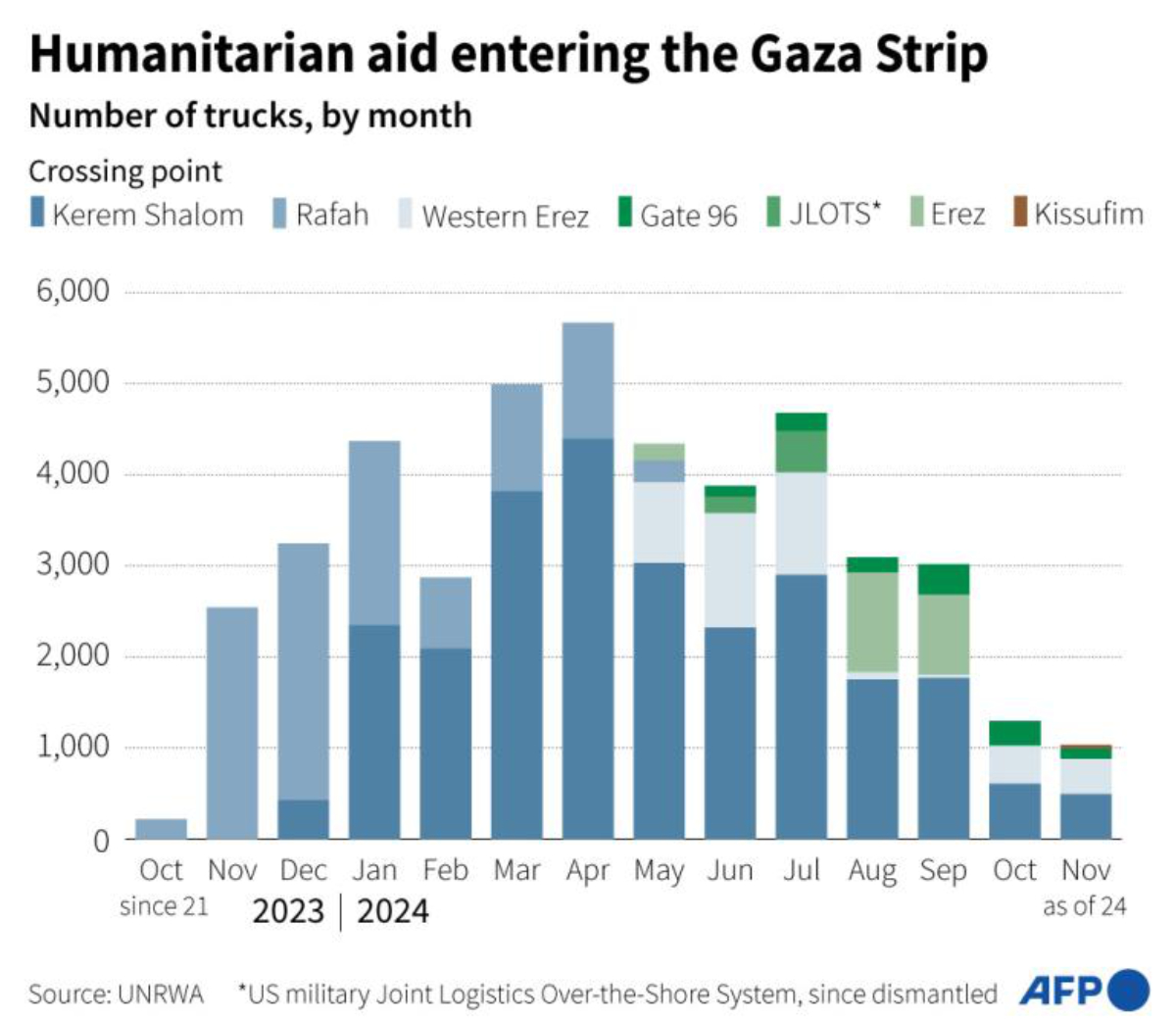
“What they have endured is beyond words,” she wrote in a post on X.
She also said that “of the 70 hospital staff, reportedly 44 male staff members were detained. Only female staff, the hospital director, and another male doctor remain at the hospital. Some patients and displaced people were also reportedly detained.”
The Israeli military said that its operation targeted a “Hamas terrorist stronghold” and claimed to have detained about 100 militants. It also alleged that some Hamas fighters disguised themselves as medical staff, releasing a video in which an ambulance driver said that Hamas fighters were stationed at the hospital.
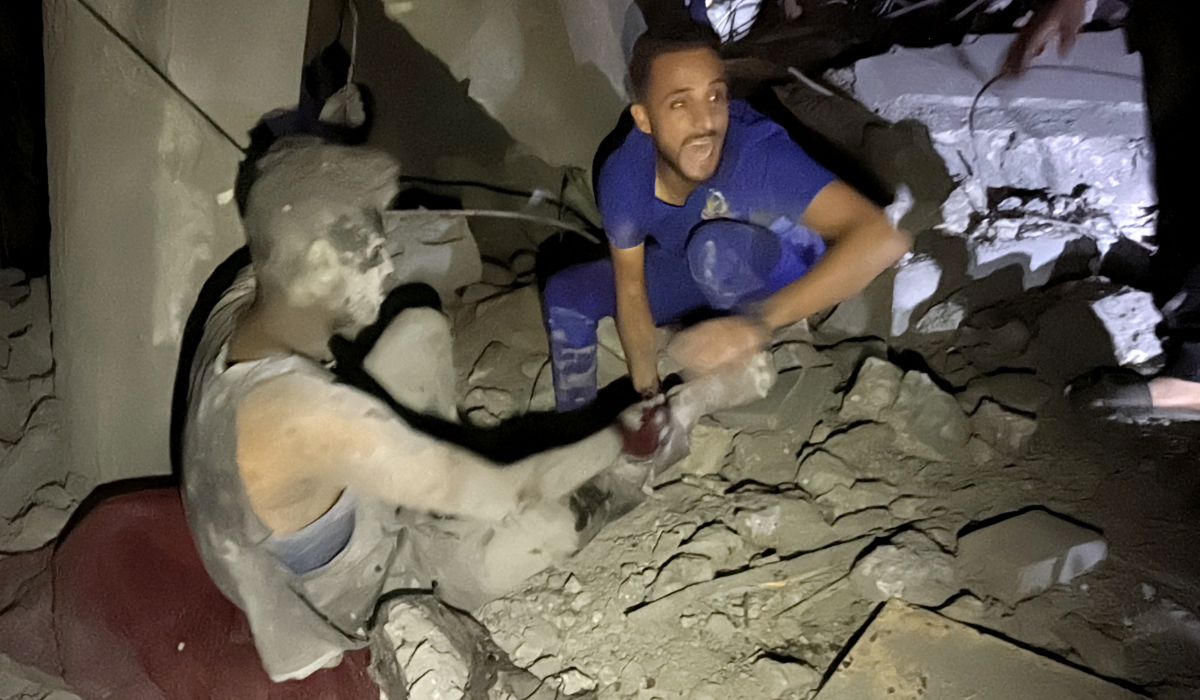
People gather as smoke rises from a UN school-turned-shelter after it was hit in an Israeli strike, in the Rimal neighbourhood of Gaza City in the northern Gaza Strip on November 14, 2024, amid the ongoing war between Israel and the Hamas militant group. (AFP)
Both hospital staff and Hamas have denied any militant presence at the facility.
Despite the withdrawal of Israeli forces, Kamal Adwan continued to face bombardment. On Nov. 24, Abu Safiya, the hospital’s director, was injured in a quadcopter strike targeting his office. He described relentless attacks on the hospital’s emergency entrance, courtyard and oxygen station, which disrupted vital supplies and care.
In a statement sent to Arab News two days before the attack, Abu Safiya said: “While we were in the emergency department checking on the injured, a plane suddenly dropped bombs on the emergency reception entrance without prior warning.
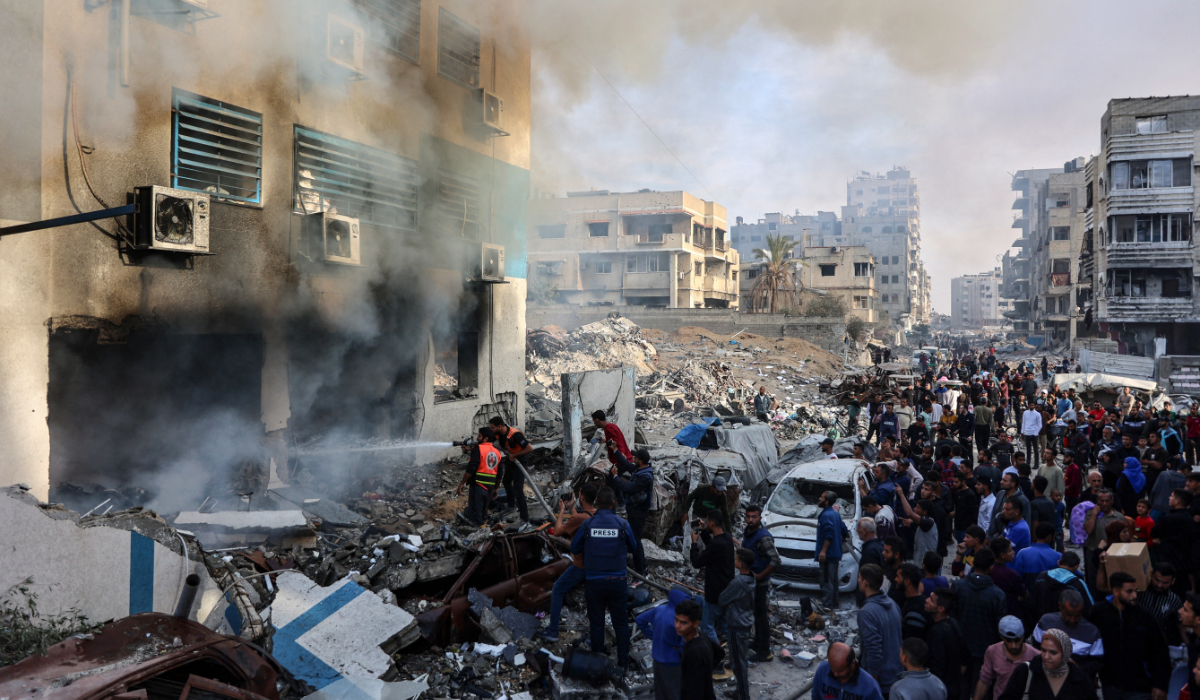
People gather as smoke rises from a UN school-turned-shelter after it was hit in an Israeli strike, in the Rimal neighbourhood of Gaza City in the northern Gaza Strip on November 14, 2024, amid the ongoing war between Israel and the Hamas militant group. (AFP)
“Four medical staff members were injured. When we transferred them to the radiology department to perform imaging for their injuries, those transporting the injured were targeted as well. Two other nursing staff members were critically injured and admitted to the intensive care unit.”
Abu Safiya added that the hospital courtyard was also bombed, severely damaging the power generators and the adjacent oxygen station, which disrupted the oxygen supply to multiple departments.
“This is not the first time Kamal Adwan Hospital has been bombed,” Abu Safiya said, referring to similar incidents in December 2022 and May 2023. During one earlier raid, Israeli forces reportedly barred doctors from providing care to critical patients, resulting in multiple deaths, according to the UN Office for the Coordination of Humanitarian Affairs.
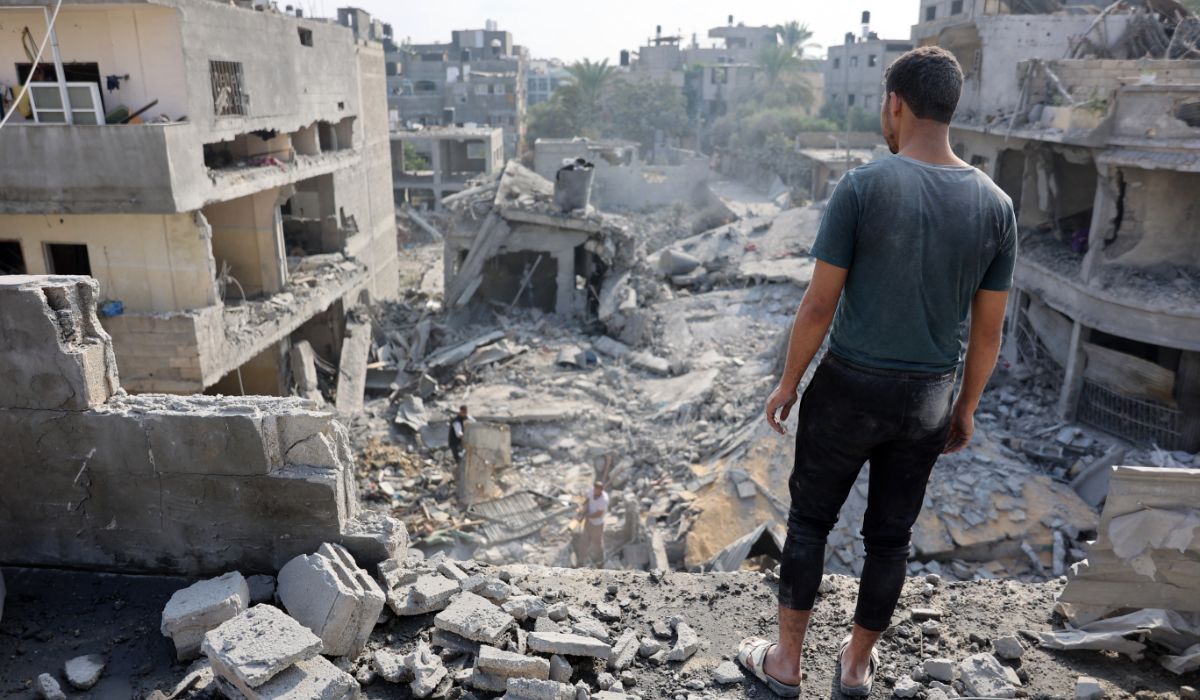
A Palestinian man stares at the rubble of the Alloush family's house, levelled in an Israeli strike in Jabalia in the northern Gaza Strip on November 10, 2024. (AFP)
He wrote that the relentless strikes “resulted in 12 injuries among doctors, nurses and administrative staff within the emergency and reception areas.
“Additionally, there was significant damage that disrupted the electrical generator, oxygen supply network, and water supply, instilling terror and fear among the injured and patients, including children and women.”
At the hospital there were 86 injured individuals, eight cases in intensive care on ventilators, and 13 child patients, he said.
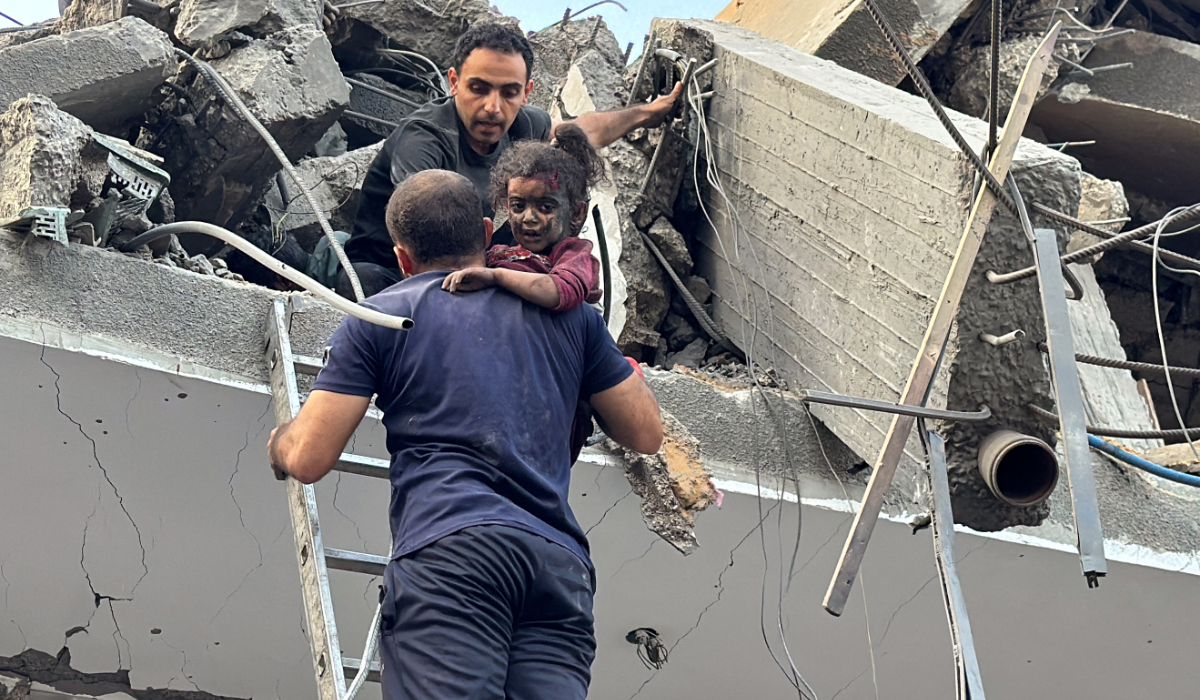
Palestinians carry down an injured child from a home that was hit in an Israeli strike on the Jabalia refugee camp in the northern Gaza Strip, on November 7, 2024. (AFP)
Malnutrition cases have also emerged in the pediatric department. Abu Safiya called on the international community “to intervene by sending surgical teams, medical supplies, and ambulances.”
The destruction of Kamal Adwan Hospital has drawn widespread condemnation from humanitarian organizations and rights groups. Medical Aid for Palestinians, a UK charity, described the attack as “another atrocity” by Israeli forces, while WHO chief Ghebreyesus demanded that the attacks on Kamal Adwan “must stop immediately.”
In a post on X on Nov. 25, he wrote that “continued attacks” on the hospital “have caused an additional 14 injuries in the past 48 hours, including the hospital director and the very few remaining doctors and nurses — this is deplorable.”
The Gaza health ministry said that the hospital’s destruction has left northern Gaza completely without medical services, further endangering the lives of thousands of civilians.
The hospital’s fate underscores the broader collapse of Gaza’s health care infrastructure amid the conflict. As of Nov. 5, only 17 of Gaza’s 36 hospitals remained partially operational, according to UN figures.
The Israeli military said in a joint statement with COGAT, which coordinates operations with the Palestinians in the West Bank and the Gaza Strip, that it had facilitated the transfer of more than 300 patients, caregivers and medical staff from northern Gaza hospitals to safer areas.
On Nov. 24, the Israeli military said that it had transferred 17 patients and their caregivers from Kamal Adwan to other facilities as part of a campaign to ensure “operational medical centers” in Gaza.
The conflict has taken a devastating toll on Gaza’s civilian population. Since Hamas-led Palestinian militants launched a surprise attack on southern Israel on Oct. 7 last year, killing 1,200 people and abducting 240 others, Israel has responded with widespread airstrikes and ground operations.
According to a Reuters count, the Israeli offensive has resulted in more than 44,200 deaths and displaced hundreds of thousands. On Wednesday, Israeli military strikes across Gaza killed 15 people, some of them in a school housing displaced people, medics in Gaza said.
The destruction of Kamal Adwan Hospital has left many northern Gaza residents without access to medical care, exacerbating an already dire humanitarian crisis. For the people of northern Gaza, it was more than just a medical facility; it was a lifeline in a region under siege.
Its destruction has further deepened the suffering of a population caught in the throes of a war that has defied ceasefire efforts. The international community has called for urgent action to address the deteriorating situation, but for now, the hospital remains a stark symbol of the human cost of the Gaza conflict.
